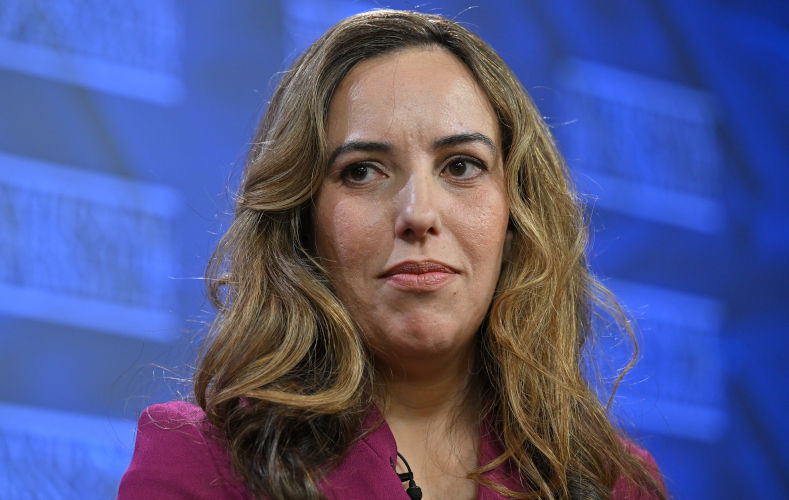Stella Assange in Australia
May 24, 2023
For those familiar with the ongoing prosecution of Julian Assange by the United States, a brutal carnivalesque endeavour that continues to blight that legal system, there is not much to be said. Assange is a political prisoner who must be freed. But the task remains for those like Stella Assange to convince politicians and journalists to embrace that course.
In addressing the National Press Club in Canberra, Stella took it upon herself to remind her audience that her husband is facing gloomy prospects across the pond for spilling the beans on the US National Security State. Once the doors open to such a prosecution on US soil, bets are off on the subject of publishing national security information in the public interest. For the first time in US legal history, a journalist, defamed and harassed, will be conveyed into the bowels of a carceral state so revolting it makes Belmarsh prison look like a modest retreat.
The method, however, lay in the personal touch, one that draws out Assange as the dedicated, loving, and intellectually stimulated everyman. There is talk about the fledging rainbow lorikeet that her husband reared when he was on Magnetic Island off the coast of Townsville in Queensland. Remembering the chestnut coated mare which he would ride when he stayed in the Northern Rivers. There was also surfing in Byron Bay in his teens, and beekeeping in the Dandenong Ranges in Victoria.
Stellas agenda is clear, direct, and powerful. There is no time for frills. She knows that the realm of ideas has little truck with the breakfasting, lunching and dining journalists who titter across Canberra and offer the rest of Australia information of an embarrassingly poor quality. It was important to keep matters simple.
The adopted technique, then, is uncomplicated: focus on the man in prison, in captivity, and suffering because of it. I can tell you exactly what Julian is doing right now. It is 3 a.m. in London. Julian is lying in his cell, probably awake and struggling to fall asleep. Its where he spends twenty-two hours a day, every day.
She mentions how Julians feet only ever feel the hard, dull, even cement on the prison floor. Relief and respite cannot be found during the exercise routine. When he goes to the yard for exercise, there is no grass, no sand. Just the bitumen pavement surrounded by cameras and layers of razor wire overhead.
The cell Assange occupies is but a mere three by two metres, a situation scandalous in the absence of any conviction, and all the more so for that fact. The cold draft that comes in through the window is nullified, to some extent, by books, something poignant, given his intellectually curious state. In this sense, literature does not merely nourish the mind but literally offers a buttressing shield against the elements.
The walls of the compressed space are also covered in pictures of his and Stellas children, and of them together. In the ensemble, science is never neglected. A large colourful poster of a nebula taken by NASAs James Webb Telescope also finds its pride of place in the cell.
As for the visits, Stella remains direct and impressively unsentimental. When the children and I go to Belmarsh, usually on the weekend, we leave our belongings in a locker. We check in with the prison authorities in the visitors centre building, my fingerprint is scanned, and we get a stamp on the back of our hands. After that: the entrance, the endless queues. One of the children conflates the prison with the queue, a beautifully grim parable that could apply to any penal system on the planet that fuses the procession with captivity itself.
Having given her audience personal slices and offerings there are even more serious reflections. There is now near universal recognition of the enormous implications that this case has for press freedom and the future of democracy.
The herculean efforts by Stella and Assanges father, John Shipton, have certainly gotten the attention of the Australian Prime Minister, Anthony Albanese. In an interview with the Australian broadcaster, the ABC, earlier this month, he claimed to be doing in private what he was saying in public: that enough was enough. Diplomatic channels were being used, but the PM lamented the lack of success thus far. I know its frustrating, I share the frustration. I cant do more than make it very clear what my position is.
That measure of frustration should indicate the extent, and worth, of Australias influence and pull over their brute of an ally. Despite essentially gifting the country to Washingtons military industrial complex, gratitude towards Australian requests is not in ample supply on the Assange affair. In refusing to meet Assanges wife (he does not believe in grandstanding), Albanese continues to claim that [n]othing is served from the ongoing incarceration of the publisher. He was also pleased that the position on Assange was now a bipartisan one the opposition leader, Peter Dutton, had also joined the pro-release advocates.
For all this, the prime minister is also entertaining a doomed equation: that Assanges release will probably be achieved only after the time he has already served is deemed sufficient relative to the time he would get were the allegations against him proved. Given that the 18 charges levelled against Belmarshs most prominent political prisoner would yield prison sentences anywhere up to 175 years, expectations must be dampened. For all that, Stellas observation that her husbands life was in the hands of the Australian government remains powerfully pertinent. If not now, when?
You may be interested to view Stella Assange’s address at the National Press Club:

